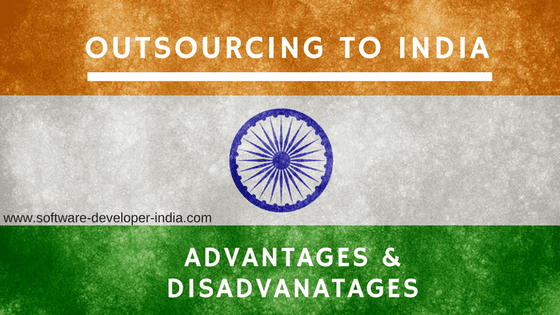Outsourcing to India: Advantages and Disadvantages

Businesses often allocate specific business process to service providers outside of their company. This could be within their country or outside it. This process of outsourcing has been a major boost to realise business goals apart from requisitioning resources and saving manpower.
Did you know that the trend of outsourcing dates back to very ancient times, as far as 1700s? The idea started around the time of Industrial Revolution when manufacturing companies started looking for cheaper countries to manufacture their products. If the major concerns during that time were cost saving and controlling the headcount, the major concern today is to stay ahead in the business utilizing one’s own core competencies.
Companies started outsourcing work for which they had no competition internally, especially the non-core functions.
India is a major player in outsourcing and has been attracting work from various parts of the globe. This is because the quality of work delivered across several verticals remains consistent (especially, when you hire the experts) and at par with what is expected. The BPO sector in the Indian IT/ITES industry is the second largest in the world, and is still growing at an enormous rate.
Now, let’s look at the major advantages and disadvantages of outsourcing to India
Abundant English speaking manpower
Language is a major concern while allocating work to a person. Proper communication skills from both parties ensure successful outcomes. India, when compared to China has an outstanding record of possessing exemplary English language skills, thereby giving birth to constant and open channels of communication. Other main competitors that Indian faces are Russia, Philippines, Ireland, Israel and Indonesia. The language system in India is the main strength behind it, thanks to the well-developed education system in the country.
India has a huge talent pool

The supply of manpower in India is really incredible because of diverse backgrounds from which people come. You have engineers, science and financial experts, MBAs, journalists, virtual assistants and a whole lot of others who possess incredible talents. You will find any number of talents in the following sectors -Pharmacy, Biotechnology, Medicine, Law, Education & Training, Analytics, Design & Animation, Engineering, Research & Development, Paralegal and Intelligence. There was a shortage of highly skilled manpower in other countries which India seemed to fill.
Indians are willing to work at odd hours
One of the best things about India is that people are willing to work at their clients’ hours. They can work during the day so the work reaches them by the time it is working hours for the client. This way the clients are assured of quality work and no lost days. And they work nights to ensure there is constant collaboration when needed. This flexibility is a major advantage of India.
Companies can focus on core competencies
The staff at a company will not be entirely skilled at all the tasks. So the best thing to do would be to outsource them to people who are talented and skilled at it. This way your staff will not have to waste time, money and resources to do something they are not skilled at. They can concentrate on core competencies and work towards realizing business goals.
Largest young employable population
India is presently on its way to becoming the nation with the largest young employable population in the whole world. As youngsters are introduced to a digital trend very early in life, the average working Indian would be around 29, which is much lower than other countries. 37 is the average age for a Chinese person, and 48 for Japanese employable population.
Strangely enough, it is some of the advantages that we mentioned above that leads to disadvantages of outsourcing as well. Let’s look at a couple of them:

Language barrier
Earlier we mentioned that Indians can handle outsourced work because they have excellent skills in English language. But often writing skills surpasses their speaking skills and when messages are conveyed through Skype calls or regular telephone calls, chances are certain words could be misinterpreted. The pronunciation, tone and intonation vary from the Indian way of speaking English. However hard you try, it is not easy for an Indian to speak like a Westerner.
Work can be sourced only from English speaking countries
As English is the only medium in which most Indians communicate to the outside world, problems could crop up, especially for the general employment segment. In such cases, outsourced work can be received only from English speaking countries.
Quality of work could suffer if you don’t assign tasks to a reliable agency
If you look at the number of outsourcing companies in India, you will have your head reeling. There are too many of them, while only a few of them provide quality work. If quality of work must be at par with your expectations and business goals, don’t simply go by what their websites say.
Ensure you give work to companies with a workforce who has undergone excellent training. Be wary of people who jump at your offer and look eager to please. And make sure you don’t give anyone tight deadlines at first, because this could be major hindrance to quality of work.
Conclusion
When you weigh the pros and cons, you can see the former outweighs the latter. To ensure you secure only advantages while outsourcing to India, make sure you do your research well. It is always advantageous to seek references from people who have already done similar projects. It is also important to check out reviews before you actually outsource work. Now, the actual question arises – What should you really outsource?
Anything that doesn’t fall within the realm of the core competencies of your company can be outsourced. As examples you have the following:
- Design works like business cards, logos, brochures and other collateral.
- Web development (India is pretty famous for that).
- Professional writing for your website, press release, content, social media marketing, etc.
- Information Technology, where the ability to write codes is really good, and you have infrastructure in India that surpasses expectations.
- Finally, Taxes and payroll, since you get skilled accountants and financial experts handling your business finances.
Interesting links about the topic:
Outsourcing to India – Pros & Cons
Main Disdvantages Of Indian Outsourcing
Main Advantages Disdvantages Of Outsourcing to India
Pictures: Flickr.com/Nicolas Raymond| Niyam Bhushan

The author: Reema Oamkumar is engaged as a thought leader at www.Software-Developer-India.com which is a part of the YUHIRO Group. YUHIRO is a German-Indian enterprise which provides programmers to IT companies, agencies and IT departments.
Leave a Reply